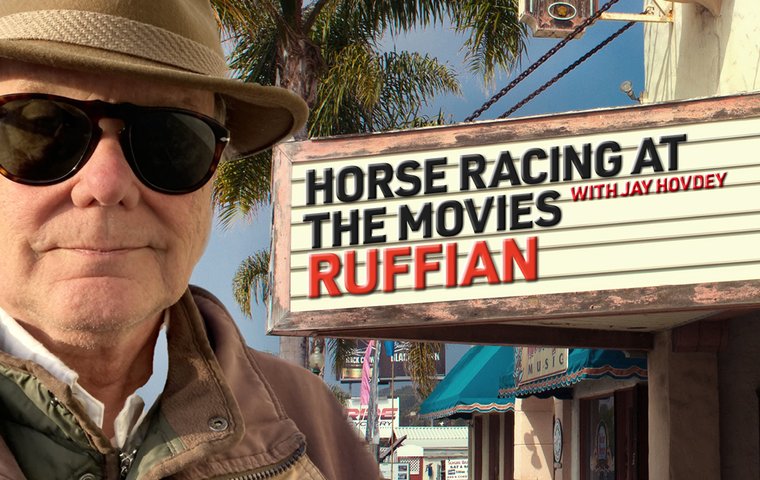
In his monthly series, our film expert revisits a compelling ESPN Original made-for-TV drama featuring the most tragic of equine heroines
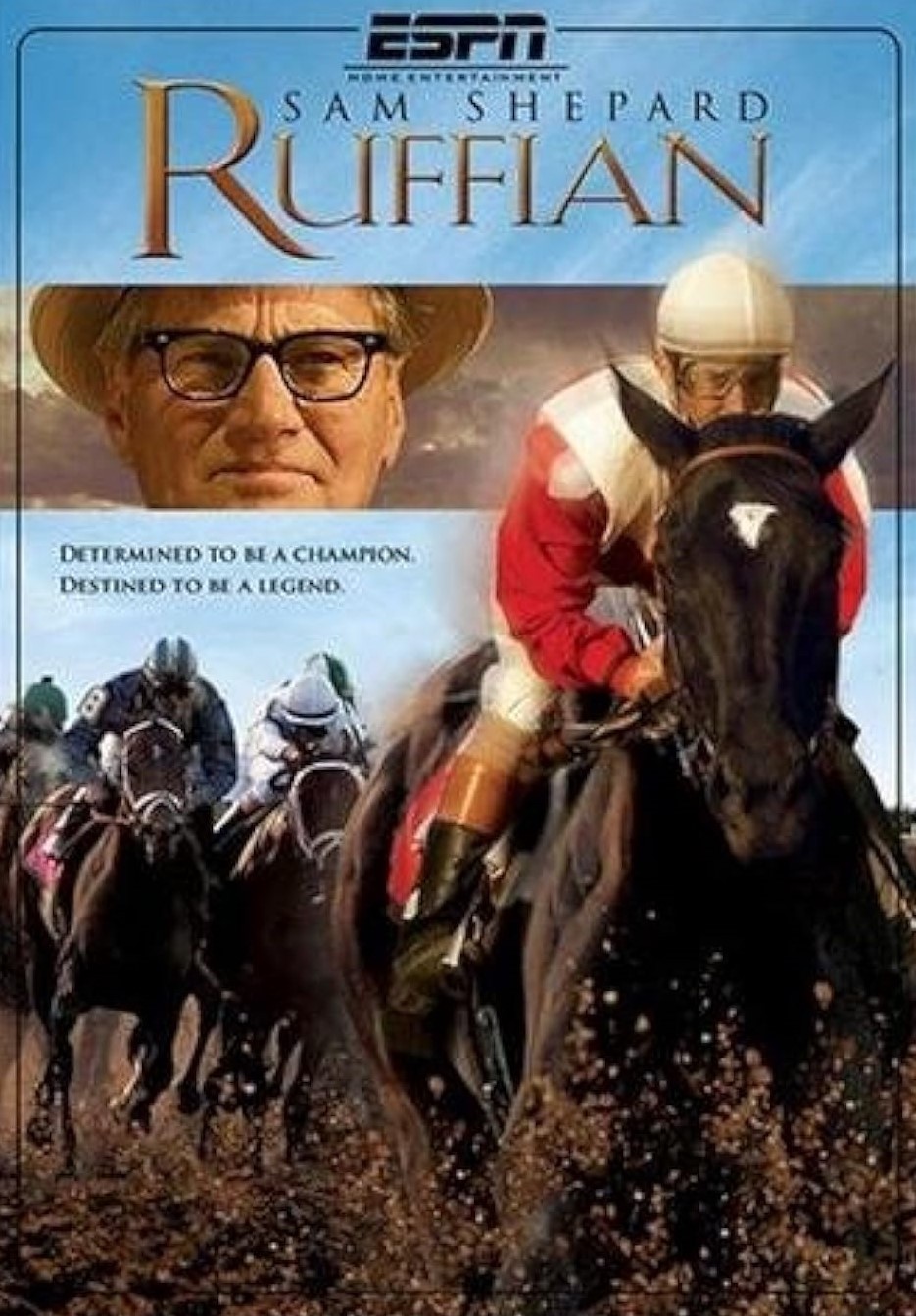 Ruffian (2007)
Ruffian (2007)
directed by Yves Simoneau; starring Sam Shepard, Frank Whaley, Nicholas Pryor
When it comes to non-fiction movies with a tragic ending already baked into the cultural consciousness, the viewer enters into a kind of masochistic bargain. They can only hope the journey is worth the weeping at the end.
Gary Cooper’s “luckiest man on the face of the Earth” speech as Lou Gehrig in The Pride of the Yankees helps ease the pain of his terminal affliction. Brian’s Song, with its star-making turns by James Caan and Billy Dee Williams, offers a layered story of race, friendship, and football highlights before death by cancer commands the stage.
Then there is Ruffian, from ESPN Original Entertainment, a movie made for TV that begins with the ghostly, black-and-white vision of a fearsome Thoroughbred in thundering action and ends … well, everyone knows how it ends.
At least they should know, because the death of Ruffian as a result of injuries sustained in her 1975 match race at Belmont Park against Kentucky Derby winner Foolish Pleasure traumatized a generation of racing fans. Many of those same fans were still around when Ruffian was aired on ABC, compelled to watch out of morbid curiosity, only to be horrified all over again.
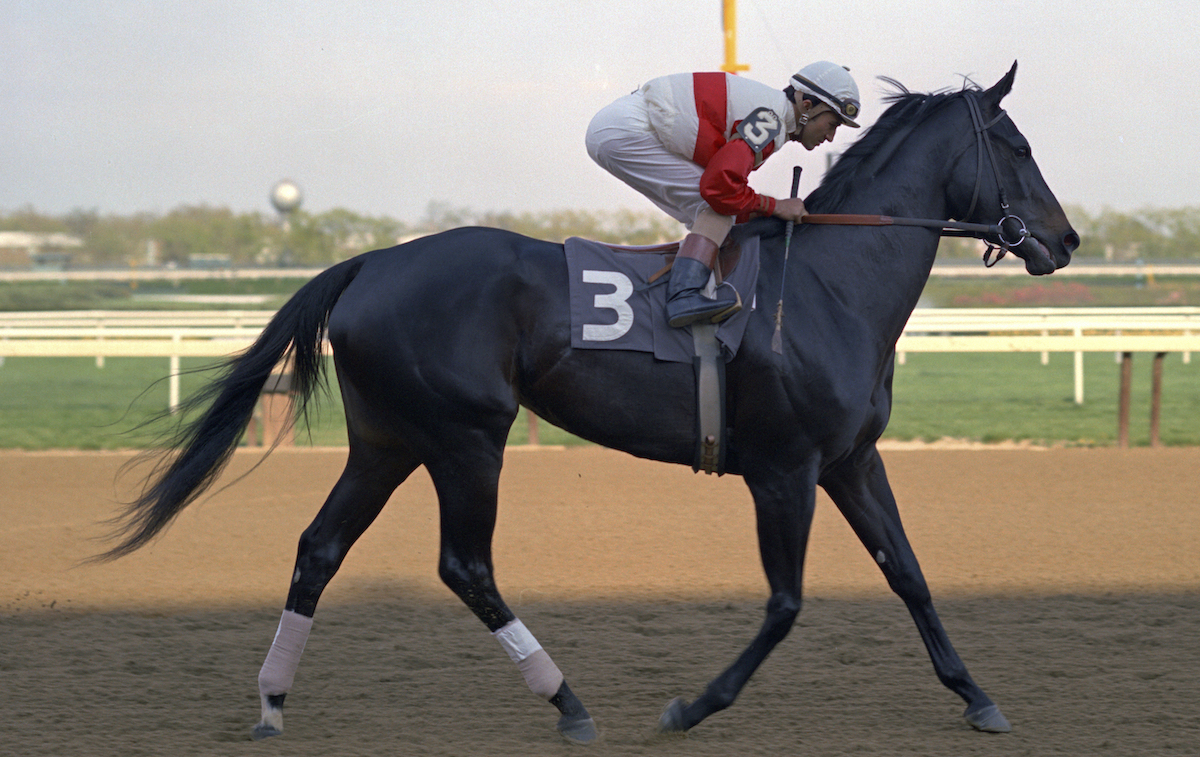 August 23 marked the 50th anniversary of Ruffian’s 12¾-length victory in the 1974 Spinaway Stakes at Saratoga, her final start as a two-year-old. Her race set the imagination afire at the prospect of someday facing Foolish Pleasure, her young male counterpart, and much is made in the film of her trainer’s reluctance to throw Ruffian against colts.
August 23 marked the 50th anniversary of Ruffian’s 12¾-length victory in the 1974 Spinaway Stakes at Saratoga, her final start as a two-year-old. Her race set the imagination afire at the prospect of someday facing Foolish Pleasure, her young male counterpart, and much is made in the film of her trainer’s reluctance to throw Ruffian against colts.
Hungry media
The pressure placed upon the trainer, Frank Whiteley Jr., comes from a hungry media and a racetrack management de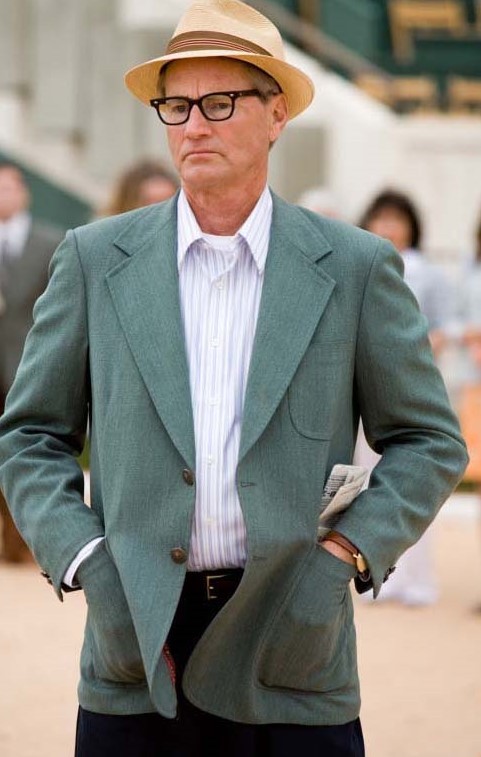
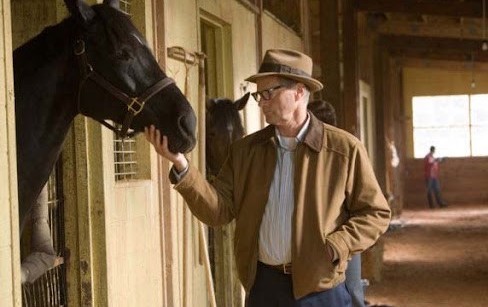 sperate for a business boost. In storytelling, this is a page right out of Foreboding 101—the undetected loosening of a bolt early in the plot, the distant drift of an innocent iceberg.
sperate for a business boost. In storytelling, this is a page right out of Foreboding 101—the undetected loosening of a bolt early in the plot, the distant drift of an innocent iceberg.
Whiteley’s reticence, as played by Sam Shepard, is classically sound. Unlike their European counterparts, who toss their best females against males for fun and profit, American trainers and owners have traditionally enjoyed a well-endowed array of stakes for their best fillies and mares. There has never been a compelling need to cross gender lines.
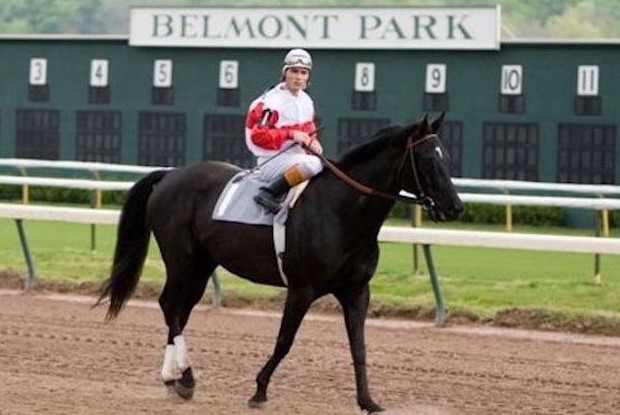
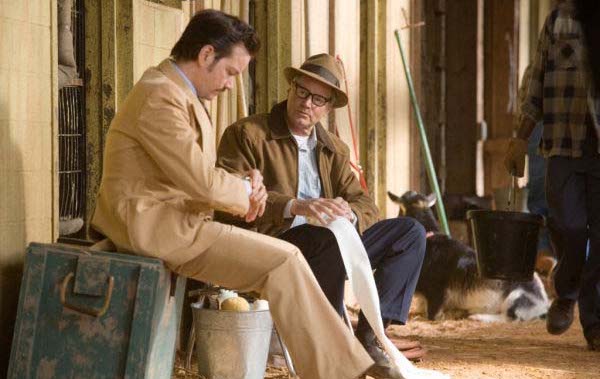
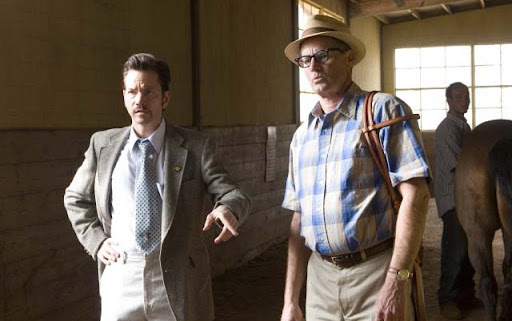 However, it is generally conceded that no female Thoroughbred deserves unqualified reverence without a victory over males. Even Whiteley – the real Whiteley – was on record in agreement.
However, it is generally conceded that no female Thoroughbred deserves unqualified reverence without a victory over males. Even Whiteley – the real Whiteley – was on record in agreement.
“Maybe she’s a great horse, but you can’t say that until she beats colts,” Whiteley told Tex Maule in Sports Illustrated after the Ruffian’s 1975 Acorn Stakes victory. “When will I run her against colts? I don’t know. Not soon. I don’t know what I’m going to do with her. So you don’t know either.”
As for match racing, the subject always has been problematic. Certainly Seabiscuit, the Oscar-nominated film from 2003, revived the notion that a match race could rivet the national attention.
In an attempt to discourage Ruffian’s owner from knuckling under to the pressure of the match, Shepard’s Whiteley says: “I just don’t think a match race is the right thing for her. That colt’s gonna be breathing on her every step of the way. They’re gonna have to sprint a solid mile and a quarter.
Great racehorse
“She’s a great racehorse. Maybe one of the best ever. If we don’t push her she just might have a chance to prove it.”
Whether or not the real Frank Whiteley would have said something like that is lost in time. Bill Mott, a spiritual descendant of Whiteley, was once asked to name the hardest thing about being a racehorse trainer.
His answer? “Saying no.”
Ruffian does not cite as source material either Ruffian: Burning from the Start, a fine book by Jane Schwartz, or input from either Whiteley or Jacinto Vasquez, Ruffian’s primary jockey. In fact, both men took court action to stop the broadcast of the film unless it included an on-screen concession that it was a fictionalized account. They were unsuccessful.
Anyway, the producers had hired William Nack (right), who covered Ruffian while on the racing beat for Newsday, as a consultant. Nack had gone on to write a seminal biography of S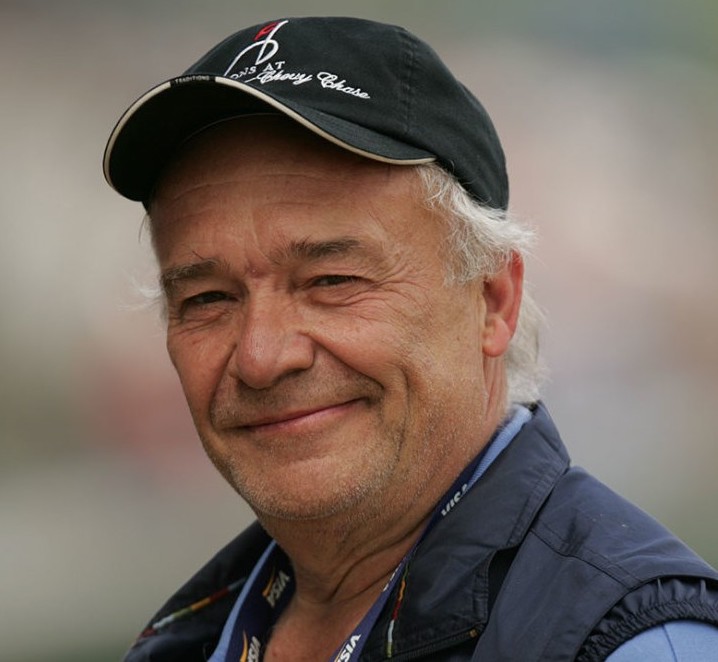 ecretariat and enjoy a stellar career with Sports Illustrated. When the movie came calling, he already was associated with ESPN, performing on-air essays. Nack died in 2018.
ecretariat and enjoy a stellar career with Sports Illustrated. When the movie came calling, he already was associated with ESPN, performing on-air essays. Nack died in 2018.
As ‘Bill Nack’, the boyish veteran Frank Whaley already had been seen in everything from The Doors and Born on the Fourth of July to an unhappy turn in Pulp Fiction (“Check out the big brain on Brad!”).
Whaley plays Nack as a gadfly reporter who keeps popping up at Whiteley’s shoulder with timely exposition, wearing a cheesy three-piece suit and a droopy moustache.
Shepard, who died in 2019, considered himself a playwright first and foremost and had a Pulitzer Prize to prove it. But his nearly 70 movies as an actor included performances of understated power in films as varied as Steel Magnolias, The Right Stuff, and The  Pelican Brief.
Pelican Brief.
Shepard (right) was also a horseman. That part required no pretense. He got the exterior look of Whiteley down pat and enough of the interior to craft a version of a supremely assured Thoroughbred trainer who suffered neither fools nor foolishness gladly.
Frank Whiteley really did turn his hose on a reporter, like his character does in the film, and he really did send photographers to stable ringers instead of the real thing, if he thought they were dumb enough not to know one horse from another. And if the lovely scene in which Shepard lets the recovering Ruffian follow him at liberty around an indoor arena on Christmas Day did not really happen, it should have.
On the Ruffian airing date of June 9, 2007, the network could not have asked for a better lead-in. Earlier that afternoon on ABC, the Kentucky Oaks-winning filly Rags To Riches defeated the Classic-winning colt Curlin in the Belmont Stakes. Ruffian aired at 9pm to generally favorable reviews, although the last 22 minutes are harder to watch than Sophie being forced to make her choice.
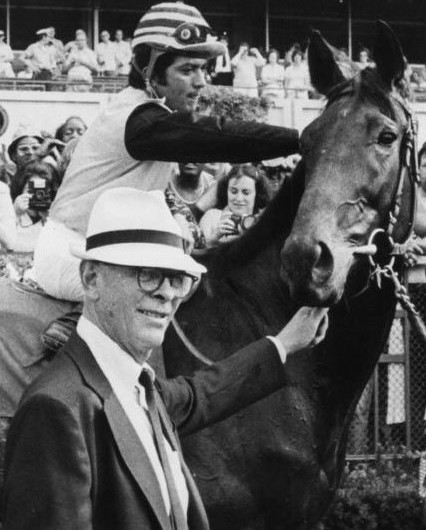 “I remember the blue tarpaulin going up in the distance as they loaded her onto the ambulance,” said Dave Johnson, who became New York’s announcer in 1972 and called every one of Ruffian’s nine New York races, including the match.
“I remember the blue tarpaulin going up in the distance as they loaded her onto the ambulance,” said Dave Johnson, who became New York’s announcer in 1972 and called every one of Ruffian’s nine New York races, including the match.
Greek chorus
Johnson is the only member of the Ruffian cast who was present for the actual events. He is used throughout as a kind of Greek chorus accompanying the action sequences, embellishing his original calls.
“We had a hook-up that night in my booth so I could reach WCBS in New York,” Johnson said. “Marshall Cassidy, the back-up announcer, was at the clinic where they did the surgery. He’d call me with updates, and I’d do 20 or 30 seconds on the radio every half-hour, until I left at around 11 o’clock that night.”
Ruffian died at 2.20am the next morning, June 10, 1975.
“I still have memories of the trauma we all went through,” Johnson said. “The lead-up to the race was a helluva celebration. They had buttons and T-shirts. ‘I’m for Ruffian’ and ‘I’m for Foolish Pleasure.’ Chic Anderson was calling for the network telecast and I was calling for the track, but after she broke down, I didn’t say much as Foolish Pleasure went on around.”
To keep one’s professional cool in such a circumstance is admirable, especially when it is your voice going out to a suddenly silent crowd of more than 56,000. The movie gives Johnson an eloquently simple tag line to the moment as he looks down at Foolish Pleasure in tragic isolation and says: “The match race is over.”
In 2007, trigger warnings were yet to be deployed. Be advised that the moment of Ruffian’s injury is briefly, though graphically, portrayed. The crisp, clinical editing of the emergency triage does not make it any easier to watch. Her last hours in surgery and unsuccessful recovery are intercut with the agony of the humans in her orbit.
I could have done without the final closing of Ruffian’s eye, as the lethal dose of barbiturate takes hold. But since we’d been on her journey from the beginning and taken the wild and glorious ride, I guess there’s an obligation to be there at the end, as well.
• For some reason, Ruffian is not available on a streaming service. The DVD is still for sale, though, and there are a couple of passable versions on YouTube
‘The sport deserves a better cinematic version of Secretariat – and so does Secretariat’
View the latest TRC Global Rankings for horses / jockeys / trainers / sires


